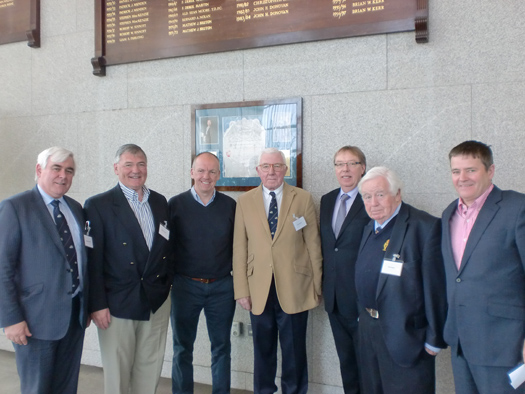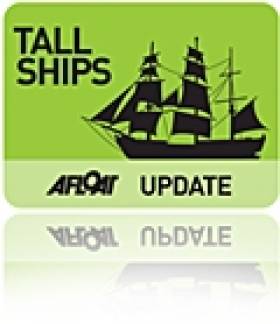Displaying items by tag: Jimmy Tyrrell
Dubin's Lord Mayor opened a Tall Ship and Youth Sail Training Workshop with an agenda to seek a solution to the current Irish Sail Training impasse caused by the loss of sailing's Asgard II and Lord Rank.
Over 70 delegtes including many of the 'top brass' of the Irish Tall Ship commuunity attended the meeting held at the offices of Dublin Port Company on Saturday (26th March). The meeting inlcuded members of Coiste an Asgard, port companies, education, tourism and other sailing interests.
The meeting was formally opened by Dublin Lord Mayor and Port Admiral, Gerry Breen who introduced the chairman Lord Glentoran and the Facilitator Michael Counahan.

From (Left to right) Seamus McLoughlin, Dublin Port Head of Operations, Enda Connellan, Chairman Tall Ships Dublin 2012, Des Whelan, Chair Tall Ships Waterford 2011, Lord Glentoran (Robin Dixon) Chair Tall Ships Belfast 1992, Dr. Gerard O'Hare, Chair Tall Ships Belfast 2009, Ted Crosbie, Tall Ships Cork and Enda O'Coineen, LetsdoitGlobal.
Des Whelan gave an excellent talk and presentation on Tall Ships Waterford which was followed by a discussion on the massive economic benefits of bringing Tall Ships Festivals To Dublin, Cork and Belfast. Chairman of Tall Ships Dublin 2012 Enda Connellan and Ted Crosbie of Tall Ships Cork and Dr. Gerard O' Hare of Tall Ships Belfast discussed the incredible success stories from their respective ports festivals.
Several presentations and discussions followed regarding the role of Tall Ships in Sail Training, the connection between a vessel for Ireland and running events here. The question of who are the stakeholders and how can benefits be quantified was also discussed.
The meeting was hosted by Dublin Port Company who provided a warm welcome, excellent facilities, refreshments and a wonderful lunch with senior management attending to everyone's needs.
After lunch there were further discussions on what is the most suitable vessel, who should run the organisation and what would work best for Ireland.
Jimmy Tyrrell gave a short, eloquent and emotional account of Asgard II and the realisation of his father's dream which was fulfilled beyond all expectation by that legendary vessel and those who were privileged to sail on her. He affirmed his own belief that the way forward was with an All-Ireland Tall Ship and even suggested that she be called Spirit of Ireland. There were other suggestions for a name inlcuding 'Ireland's Call'.
A view was also expressed that politics and religion have no place in Sail Trail Training and the future lay in an All-Ireland Commercial/Charitable Trust Venture.
The prohibitive nature of current legislation and the total lack of awareness of the maritime sector by the Government was mentioned several times.
Ocean Youth Club NI provided four young sail trainees to address the gathering on the benefits of Sail Training from their perspective and representatives from education, tourism Tall Ships International and "Association Of Tall Ships Organisations" also contributed.
The general consensus was the need to develop and promote, as a matter of urgency, a plan for a Tall Ship For Ireland linking Youth, Maritime Education, Business and Tourism.
Another workshop will be held in Belfast in April and the collective input of both meetings will be considered going forward.
A Tall Order for Ireland? HERE
Regular updates on Irish Tall Ship sailing news HERE
More on Asgard II HERE





























































